Adaptation by Remix: Vidding Feminist Science Fiction
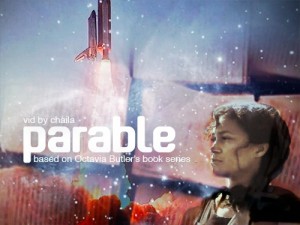 I’m excited to join the all-star team of occasional contributors here at Antenna––and to begin with response to media goings-on at the feminist science fiction convention WisCon, which took place in Madison over Memorial Day weekend. For its 36-year history WisCon has primarily focused on written science fiction, but it has a growing presence of television, film, comics, and video game fandoms. WisCon has been holding fan video screenings for the past three years, and the audience it provides––fans gathered by their political commitments and engagement with gender, race, and sexuality as much as by the texts and genres they love––has produced some very interesting fanworks. The video “Parable” by Chaila is a fascinating example of what that crossover can achieve.
I’m excited to join the all-star team of occasional contributors here at Antenna––and to begin with response to media goings-on at the feminist science fiction convention WisCon, which took place in Madison over Memorial Day weekend. For its 36-year history WisCon has primarily focused on written science fiction, but it has a growing presence of television, film, comics, and video game fandoms. WisCon has been holding fan video screenings for the past three years, and the audience it provides––fans gathered by their political commitments and engagement with gender, race, and sexuality as much as by the texts and genres they love––has produced some very interesting fanworks. The video “Parable” by Chaila is a fascinating example of what that crossover can achieve.
“Parable” responds to some foundational texts of feminist science fiction book fandom, Octavia Butler‘s 1990s dystopian novels Parable of the Sower (1993) and Parable of the Talents (1998). Butler’s novels have never been adapted for the screen, but Chaila didn’t let that stop her. In the absence of a media source other than the print and cover art of the books themselves, Chaila pulled together an intertextual archive from the world around her to craft an adaptation of her own.
We talk about transmedia as a way that media producers can distribute story, character, and worldbuilding across multiple platforms. To make her vid, Chaila engaged in a different kind of transmedia storytelling: one that combines fannish appreciation, critical media analysis, and grassroots production. She found the places and platforms in which stories like the Parable novels were being told, and used Butler’s ideas as a lens through which to gather diverse representations from fiction and reality into a story that articulates lived and imagined dystopias together.
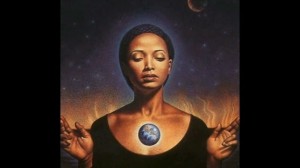 In 1993, shortly after the LA riots, Butler wrote about a Los Angeles splintered between walled communities and the desperate poor, with no state services to rely on and scarce food and water. Amid chaos and violence, iconic protagonist Lauren Olamina flees her home, builds a new one, and very carefully and consciously starts a religion––Earthseed––aimed at gathering people together around the goal of sending humans to the stars. Some elements of the story were easier to find than others. Images of urban disintegration and environmental collapse are easy to locate; a black woman’s coming of age at the heart of them, less so.
In 1993, shortly after the LA riots, Butler wrote about a Los Angeles splintered between walled communities and the desperate poor, with no state services to rely on and scarce food and water. Amid chaos and violence, iconic protagonist Lauren Olamina flees her home, builds a new one, and very carefully and consciously starts a religion––Earthseed––aimed at gathering people together around the goal of sending humans to the stars. Some elements of the story were easier to find than others. Images of urban disintegration and environmental collapse are easy to locate; a black woman’s coming of age at the heart of them, less so. 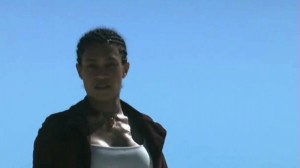 Chaila found her Lauren in Patricia McKenzie’s role as Reena from the 2005 TV show Charlie Jade, one of many easily-forgotten shows set after the collapse of technological society. As Liz Henry remarked at a different WisCon panel, the stories that speculative fiction has been telling this decade have been characterized by the “mid-apocalypse”; the world is always ending, and stories about how people might learn to live in the ruins are thick on the ground.
Chaila found her Lauren in Patricia McKenzie’s role as Reena from the 2005 TV show Charlie Jade, one of many easily-forgotten shows set after the collapse of technological society. As Liz Henry remarked at a different WisCon panel, the stories that speculative fiction has been telling this decade have been characterized by the “mid-apocalypse”; the world is always ending, and stories about how people might learn to live in the ruins are thick on the ground.
“Parable” brings together at least three genres of online video: book trailers, vidding, and political remix. Making videos for books is not a new idea; book trailers have been around for a while. But book trailers, whether for original or fan fiction, function as advertisements to encourage readers to seek out the text. “Parable” is best appreciated if you’ve already read the Parables. Though she was inspired by book trailers, in making “Parable” Chaila was vidding. She sets visual material to a song in order to make an interpretation, craft an argument. WisCon gave her an audience who would both recognize the story she was adapting for the screen and have the vidding literacy to appreciate the interpretations she is making.
The kind of interpetation Chaila makes––of Butler’s story in the light of media sources, and of media sources in the light of Butler––brings “Parable” into the territory of political remix video’s activist interventions into media representation and current events. Chaila has remarked that the footage she found hardest to find was that of the multi-ethnic but largely non-white community Lauren builds. Yet imagery of torture––which takes place in the books but is only briefly described––was far easier to come by. Her search underlines at least one of the reasons why the vivid, visual, and painfully current narrative of Butler’s Parables has never been brought to the screen: the overwhelming whiteness of popular media, particularly science fiction, and the limited range of roles available for actors of color.
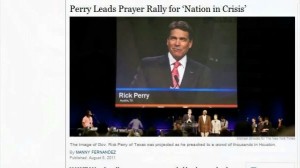 Yet the vid’s political intervention does not only come from its weaving of TV and film’s post-apocalyptic sci fi tropes with the constructed story of a rare black woman protagonist. Many visuals Chaila uses are not fiction but news, drawing parallels between Butler’s imagined twenty-first century and the real one. In Parable of the Talents, a far-right organization named Christian America comes to power and persecutes the fledgling Earthseed community for its political and alleged sexual deviance. Chaila links this to Rick Perry and Rick Santorum’s fulminations from political pulpits in 2011, suggesting that these are the figures who could make the real 2020s similar to Lauren’s fictional experiences if we do not learn from her example and try to make things change. An audience member at WisCon wondered whether these clip choices were too specific, whether they would date the vid.
Yet the vid’s political intervention does not only come from its weaving of TV and film’s post-apocalyptic sci fi tropes with the constructed story of a rare black woman protagonist. Many visuals Chaila uses are not fiction but news, drawing parallels between Butler’s imagined twenty-first century and the real one. In Parable of the Talents, a far-right organization named Christian America comes to power and persecutes the fledgling Earthseed community for its political and alleged sexual deviance. Chaila links this to Rick Perry and Rick Santorum’s fulminations from political pulpits in 2011, suggesting that these are the figures who could make the real 2020s similar to Lauren’s fictional experiences if we do not learn from her example and try to make things change. An audience member at WisCon wondered whether these clip choices were too specific, whether they would date the vid. 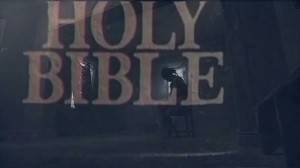 Yet these are the moments in the vid that pull us out of the spell its seamless production casts, that make us think not only about the impressive adaptation Chaila has crafted but about the disturbing realities that surround us. Perry and Santorum may or may not be recognizable names in a couple of years, but their iconic similarity to fictional dystopia insists that their mode of politics is not a flash in the pan.
Yet these are the moments in the vid that pull us out of the spell its seamless production casts, that make us think not only about the impressive adaptation Chaila has crafted but about the disturbing realities that surround us. Perry and Santorum may or may not be recognizable names in a couple of years, but their iconic similarity to fictional dystopia insists that their mode of politics is not a flash in the pan.
For Octavia Butler fans, the tag line for “Parable” neatly condenses how the vid uses the future of the past to talk about the present: In July 2012, Lauren Olamina will turn three. In vidding novels 19 and 15 years old, Chaila turns our gaze on their prescience. Not only in relationship to apocalyptic fictional tropes, but to the real world and real politics as well.



[…] Adaptation by Remix: Vidding Feminist Science Fiction – My friend Alexis writes about Chaila's Wiscon premiere vid, taking visual sources and creating a video for Octavia Butler's "Parable of the Sower" and "Parable of the Talents" that draws from the genres of book trailer, fanvid, and political remix. […]